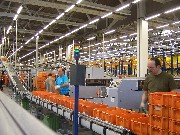Army of the invisible – modern slaves

Undercover story of the life of delivery workers in Germany
by Günter Wallraff
Fast and cheaper are the two values in the delivery industry – it is one of the fastest growing businesses in the world and within Europe, only, there are 250,000 to 300,000 drivers who make this possible by working for low wages. Günter Wallraff worked as an undercover journalist in GLS, a daughter company of Royal Mail UK, and described in his reportage the life of a delivery worker. 5 Euros per hour or even less is the usual salary in Germany and working days of 12 hours or more without breaks, which has been facilitated by the German government which deregulated and liberalised the sector.
The companies are working mainly with sub-contractors, and in this way they can out source the risk. For the drivers it means this: sorting and delivery in the shortest possible time means extra stress (working hours without break), hard physical work (lifting more than 230 parcels or more than 1 tonne per day), but also social skills in contact with customers are part of the business. At the same time the risk to get fines for overweight cars, speeding tickets and costs for vehicles, uniform and cleaning rest with the drivers and sub-contractors. The staff turn over for drivers is extremely high and detracts from quality services in the business. The legislation in Europe makes this possible.
Wallraff’s report is shocking but not new. Trade Unions almost do not exist in delivery depots and every attempt to activate workers representatives or get in contact with other drivers gets stopped by the companies with threats and surveillance often by hidden cameras. The workers are faced with strict rules including financial fines for misbehavior, which are established by the delivery company and controlled and enforced by the subcontractor. The work in the distribution centers and loading the car is declared as preparation work and therefore not paid and not included in the official working time. Driving and rest times, working time regulation, etc. don’t get respected and this is carried out with the awareness of the company. The scanning system requires the workers to have technical skills but is mainly a way to control every minute of his/her working day. The vehicles used to deliver the parcels are in bad conditions sometimes not secure or even not in line with the road safety regulations, but to let them repair is too expensive in this tight business.
The results are physical and psychological problems for the workers and an overuse of amphetamines or energy drinks and painkillers. The risks for car accidents, fines or sickness stay with the driver. There is a high staff turnover as the stress and the work load can’t be handled for too long. The work makes people sick! There is no time for a social life – not even in the weekends as the people are too exhausted. And this hard work has apparently no value, not in money (1.300 euros per month before taxes or paid by parcel) nor in respect by customers (who want the delivery at best for free), and certainly not the bosses (A GLS manager in the south of Germany: “these people are just born for this! – We get anyway only the mob”). Meanwhile the companies make huge profits, GLS had a plus of 10% in 2010 (in total € 145 Mio) by using dumping methods. But GLS is not the only one using dirty business to get more profit, UPS, TNT, DHL and all the others are with them.
You can find the whole story in German under the link below:
http://mobil.zeit.de/2012/23/Wallraff-Paketzusteller
This is not the only report about the situation in the delivery industry, UNI Global Union and ITF published a white paper on the labor right abuses of DHL worldwide. More links to information you can find here:
http://www.respectatdhl.org/corporate-irresponsibility.html?lang=de
http://www.ndr.de/fernsehen/sendungen/45_min/videos/minuten393.html
http://www.arte.tv/de/Videos-auf-ARTE-TV/2151166,CmC=3159952.html

